

SS-Writing-a-literature-review.doc. How to write a literature review · Library "How To" Guides · Help & Instruction · Concordia Libraries. Not to be confused with a book review, a literature review surveys scholarly articles, books and other sources (e.g. dissertations, conference proceedings) relevant to a particular issue, area of research, or theory, providing a description, summary, and critical evaluation of each work.
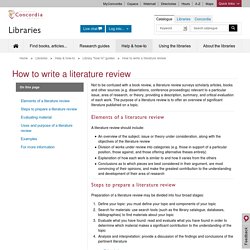
LitSearch.doc. An extended summary of BEME Guide No 3. BEME guide no. 3: systematic searching for evidence in medical education. Systematic_Literature_Searching.ppt. Cochranecoll_PHAA_SRworkshop07. IntroSystematicLitSearch.pdf. Literature Searching & Reviewing - Nursing and Midwifery - LibGuides at Edinburgh Napier University. What is critical appraisal?
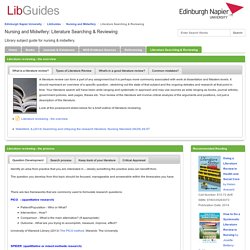
Why do we do it? Following retrieval of all pertinent research papers from your literature search, critical appraisal will identify the strengths and weaknesses of what you have found. Authors may exaggerate their findings or there may be methodological flaws in the research. Critical appraisal lets you make informed decisions about the quality of the research evidence. Critical appraisal is often carried out using checklists that help signpost areas to look for while reading a paper. Critical Appraisal Tools / Checklists CASP - eight critical appraisal tools for use when reading different types of research. SIGN - six lists from the Scottish Inercollegiate Guidelines Network CEBM - four lists from OXford's Centre for Evidence Based Medicine Critical Appraisal Resources Book Greehalgh, T (2010) How to read a paper : the basics of evidence-based medicine. 4th ed.
Videos Two excellent videos from Andrew Booth at SCHARR at the University of Sheffield. Alumni Medical Library: BUSM Portal. Alumni Medical Library: Online Tutorials. Other Search Options: Access Email Tutorials Faculty can contact David Flynn, at (617) 638-4271, or dflynn@bu.edu to arrange the creation of a tutorial supporting student research.
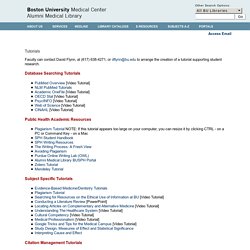
Database Searching Tutorials PubMed Overview [Video Tutorial]NLM PubMed TutorialsAcademic OneFile [Video Tutorial]OECD Stat [Video Tutorial]PsycINFO [Video Tutorial]Web of Science [Video Tutorial]CINAHL [Video Tutorial] Public Health Academic Resources Subject Specific Tutorials Citation Management Tutorials DynaMed Tutorial UpToDate Anywhere Tutorial Installing and Registering the new UpToDate Anywhere App Course Management Tutorials How to add links to Blackboard [Video] Library Passwords for BMC residents, faculty and staff See Applying for a BU/Kerberos Password Microsoft Office Tutorials Online training for Microsoft Office (Access, Excel, PowerPoint and Word), graphic design and web publishing software is available through Microsoft E-Learning.
Organization_693_1320713252.pdf. The Literature Review: A Few Tips On Conducting It. Printable PDF Version Fair-Use Policy What is a review of the literature?
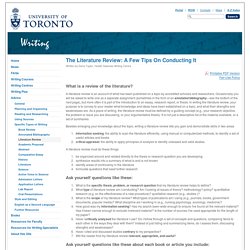
A literature review is an account of what has been published on a topic by accredited scholars and researchers. Occasionally you will be asked to write one as a separate assignment (sometimes in the form of an annotated bibliography—see the bottom of the next page), but more often it is part of the introduction to an essay, research report, or thesis. In writing the literature review, your purpose is to convey to your reader what knowledge and ideas have been established on a topic, and what their strengths and weaknesses are.
Writing in the Health Sciences: a comprehensive guide. By Dr.
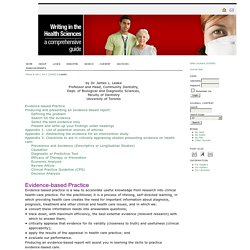
James L. Leake Professor and Head, Community Dentistry, Dept. of Biological and Diagnostic Sciences, Faculty of Dentistry University of Toronto Evidence-based Practice. Writing in the Health Sciences: a comprehensive guide. What is a Review of the Literature?
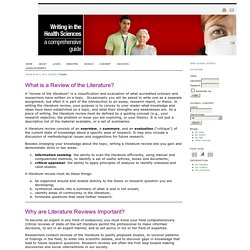
A “review of the literature” is a classification and evaluation of what accredited scholars and researchers have written on a topic. Occasionally you will be asked to write one as a separate assignment, but often it is part of the introduction to an essay, research report, or thesis. In writing the literature review, your purpose is to convey to your reader what knowledge and ideas have been established on a topic, and what their strengths and weaknesses are. As a piece of writing, the literature review must be defined by a guiding concept (e.g., your research objective, the problem or issue you are exploring, or your thesis). Study Skills - University of Greenwich. Literature searching - DOC documents. Each comprehensive literature search for a systematic review should include searching the... the manual searching and grey literature searching is an important...
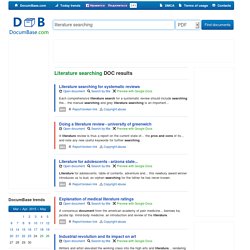
A literature review is thus a report on the current state of... the pros and cons of its... and note any new useful keywords for further searching. Literature for adolescents. table of contents. adventure and... this newbury award winner introduces us to bud, an orphan searching for the father he has never known. A consensus document from the american academy of pain medicine... barrows ka, jacobs bp. mind-body medicine. an introduction and review of the literature.
Writers and artist elevated the working class into the high arts and literature... rendering three women bend down, searching for the last wheat scraps. Bibliographies: ancient religions. including: mesopotamian, egyptian... textual criticism, literature: hebrew. israel: history to babylon captivity and restoration. Duke EBM Workshop. April 7-10, 2015 Information overload is changing all areas of medicine, including medical education and clinical practice.
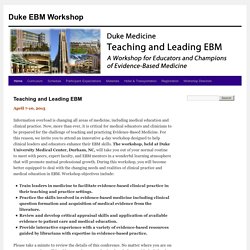
Now, more than ever, it is critical for medical educators and clinicians to be prepared for the challenge of teaching and practicing Evidence-Based Medicine. For this reason, we invite you to attend an innovative 4-day workshop designed to help clinical leaders and educators enhance their EBM skills. The workshop, held at Duke University Medical Center, Durham, NC, will take you out of your normal routine to meet with peers, expert faculty, and EBM mentors in a wonderful learning atmosphere that will promote mutual professional growth. During this workshop, you will become better equipped to deal with the changing needs and realities of clinical practice and medical education in EBM.
Please take a minute to review the details of this conference.